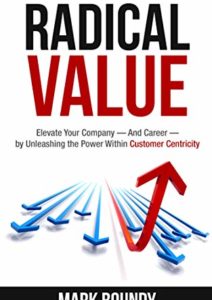Your Value Focus Journey
Part 3 of a 4 part series.
The ability to sell the value of your offer–then price it–is what pays for all of the value your company works so hard to produce.
Customer value is the kernel within “customer-focused” that moves customer decisions, and you need to focus sharply on value. In the first article in this series, I introduced three domains in which any journey toward value focus should operate. Last week, I discussed the first of those three domains, organizational alignment around customer value, and what different achievement levels look like.
Your customer value focus journey also needs to progress in a second domain: your organization’s selling capability. Working in the sales performance domain is coming up with answers to the question:
How well is everyone in your organization able to build, sell, and price customer value.
I use the term buyer enablement (walking the customer through their journey, a value-centric take on sales) domain. As you progress from average to “elite value-based seller”, skills deepen, and the number of participating roles widens radically. I use three key components of customer value engagement to describe this domain:
- Build: Uncovering and discovering value gaps, expanding them, and causing the customer to envision outcomes of having those gaps resolved.
- Sell: Aligning the seller’s solution with desired customer outcomes.
- Price: Facilitating the customer process of monetarily measuring the desirability of outcomes, then conducting a win-win pricing dialogue.
The most elite performers, those who employ radical value focus, are able to execute more sales at more profitable value-based pricing.
In this article, I describe the telltale indicators of whether you’ve moved beyond average to Good, Great, or Elite, describing characteristic behaviors at each level.
I’m also grafting in some of the research basis for these three performance levels, using a highly respected research house. Of the 12 organizational behaviors of world-class sales organizations identified by CSO Insights in their 2019 Sales Best Practices Study, (SBPS) three of them belong in this domain.

I’ll plug them in below with the note “CSOi 2019 SBPS”, then their description of the behavior they surveyed for.
Good Sales Culture
Good sales organizations know that the sales process delivers more reliable results than “hire, onboard and hope”. Good sales organizations develop playbooks and selling processes to track selling stages.
In addition, they implement a selling methodology to keep selling processes aligned with customer buying processes.
Perhaps more importantly, good performers consistently and proactively use — and preview — call plans to prepare for great sales calls. Call plans are one key marker beacon that you have a good sales culture. (CSOi 2019 SBPS: We effectively use call planning tools to prepare for customer interactions).
Forecasting at good companies is based upon a combination of qualification criteria, gut feel, and progress through the selling process (increasing probability as an opportunity progresses through the sales funnel).
Profitable sales are usually not a point of emphasis on good companies. Pricing and discounting are seldom rigorously controlled. There is probably a nominal process, but the triggers for approving discounts/price exceptions are easy for certain salespeople to game. Companies at this level seldom formally track who is discounting, how much, and to which customers. As a result, they can’t even analyze the severity and scope of their discounting behavior. Compensation plans may include a profit component, but there is no formal system in place for sellers to be capable of consistently selling value.
Great Sales Culture
Where good companies use persona-based methodology tools as team selling tools, great companies make sure that all conversations add value to the customer’s buying process. (CSOi 2019 SBPS: We Consistently conduct mutually-beneficial sales calls with customers and prospects).
Great companies also leverage everything learned about each persona into handoff tools between (for example) sales and implementation teams – and/or account management.
Sophisticated account management methodologies and executive interaction tools are used by great sales cultures to broaden and deepen relationships. (CSOi 2019 SBPS: Our Sellers Effectively Communicate Value Messages that are relevant to buyer’s needs).
Forecasting rigor improves at this level: from feel and selling process completion to opportunity fit (varying degrees of precision here) and some estimate of customer engagement in their own buying process (CSOi 2019 SBPS: We have a rigorous forecasting process that drives forecast accuracy).
Pricing and discounting rigor may develop at this level. There is probably a formal process, but discounts/price exceptions are probably still concentrated suspiciously. Even great companies seldom formally track who is discounting, how much, and to which customers, and it may not even be a point of emphasis. Compensation plans may include a profit component, but there is no formal system in place for sellers to be capable of consistently selling — then capturing (via price) — value.
Elite Sales Culture
In elite sales cultures, proactive call planning matures.
- Instead of good sales calls only by salespeople, everyone who touches the customer is able to have at least a simple value discovery interaction. Most companies find the idea of engaging all customer-facing roles in value discovery radical. Elite value cultures take advantage of the trusting relationships built throughout the customer organization.
- Conversations are designed to facilitate a customer process of monetarily measuring the desirability of outcomes, then conducting a win-win pricing dialogue. Such conversations inform value-based pricing, negotiation, and discounting/price exception processes. I can’t understand why this is so radical for so many organizations, but…it is.
Pricing and discounting rigor flourish at this level. There is a formal process in which discounts/price exception decisions are informed by accurate assessments of customer value. There is an objective system, understood by everyone in the company, for pricing decisions. Elite companies formally pricing/discounting behavior, with analytics on how much, to whom (which customers, which salespeople, which territories/regions, etc.) and on which types of opportunities pricing exceptions occur. Compensation plans almost always include a profit component, and salespeople know how to maximize both their incomes and corporate profitability.
Underneath it all lies enough customer-world business insight so that your customers know that everyone who touches them understands their business and is trying to help them grow it.
Where Are You in Your Journey? And Where Would You Like to Go?
Sales capability is one of three domains in your journey to elite value focus. It goes hand-in-hand with the other two: Company-wide alignment around value and Value-focused Enablement…the topics of my other two articles.
Comment below, like, and/or share. As always, reach out if you have more in-depth questions, or read the accompanying articles…then call me. We can talk about where you are in your journey and where you’d like to go next.
To your success!
The value you create for your customers means nothing if they don’t know it…or if you can’t sell it…or if you can’t capture a price premium for it. Do all three, and you have a rare capability.












Comments (2)
That is really a great write up
Very important lesson